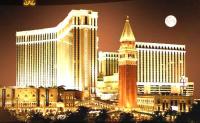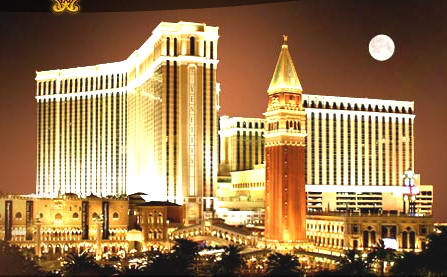 Analysts at G2E Asia think that Macau’s monthly revenue growth may rise by just 11 percent in May. Reuters report the Global Gaming Expo in Macau heard the growth percentage could be at its lowest since July 2009. Despite this it’s still on track to be the enclave’s biggest month ever, something that Grant Goversen, analyst at Union Gaming Research confirmed.
Analysts at G2E Asia think that Macau’s monthly revenue growth may rise by just 11 percent in May. Reuters report the Global Gaming Expo in Macau heard the growth percentage could be at its lowest since July 2009. Despite this it’s still on track to be the enclave’s biggest month ever, something that Grant Goversen, analyst at Union Gaming Research confirmed.
“We are on the 18th month of a gradual decline rate. May will likely see a notable slowdown in the growth rate, but a record overall number,” Govertsen said.
The fact it will still break a record flies in the face of those that think the drop in growth is at all worrying. If it gets any worse and, for example, dips as low as 8 or 9 percent growth then Billy Ng, director at Merrill Lynch Asia Pacific, thinks it will be a “very shocking number to see”.
Among those that own properties in the enclave this doom mongering simply isn’t present. Laurence Ho, chief executive of Melco Crown Entertainment, explained “With the potential for a significant increase in penetration, a supportive infrastructure development pipeline, as well as the economic growth and increasing prosperity of our major feeder market, we believe the future of Macau is well supported.”
Attention was also focused on whether Japan will decide to either say yes, no or choose to decide later – that choice to be made next week. The conference heard that regulation is likely to be slow and steady with pachinko operators being allowed in – despite now unfounded fears over them being shut out if gaming is permitted. Much of this has to with the pachinko operators, including Kazuo Okada, being needed, as they’ve been the strongest lobbying group in the push for Japanese casinos. Whatever the decision is next week it looks like the pachinko operators will be at the forefront.
Russia could be Macau’s unlikeliest of new challengers in the Far East gaming industry. Las Vegas Review Journal report that Nash Dom Primorye, a government owned corporation in Russia’s Primorsky region, will announce its intention to find developers to help them construct a new casino complex near Vladivostok – a city on the country’s South East Coast.
Marina Lomakina, general director of Nash Dom Primorye, said in a statement: “Over the next five years, the Russian Federation will continue to have a strong strategic interest in the economic development of the Far East region. Our view is that the tourism sector is a strategic economic opportunity that has yet to be fully developed. We believe that the private sector will be interested in the tourism and casino gaming potential of the (entertainment zone).
“We believe the (entertainment zone) will create a compelling experience for Asian tourists seeking a destination that is near, but culturally different.”
The “entertainment zone” she speaks of is one of four zones the Russian government earmarked for casinos when they banned them from all other areas just last decade. That could have been a masterstroke as far as they’re concerned thanks to the short two-hour plane ride to both Seoul and Tokyo from Vladivostok.
Confirmation will come at the G2E Asia conference on Wednesday with a website also likely to be unveiled on the same day.
